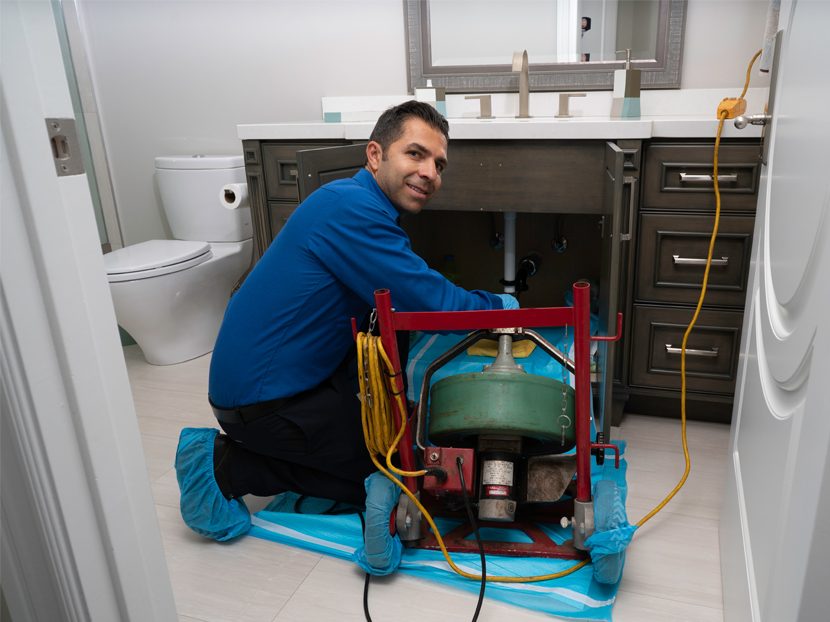John Akhoian Has a Better Plan B
Rooter Hero purposefully grows its business by looking out for the future of its workforce.

A ‘Franchiseish’ Approach
John Akhoian, CEO of Rooter Hero Plumbing, has taken a different path than most plumbing contractors.
As we learned in our main feature, Akhoian got his start as a teenager quickly making the best of learning the plumbing trade after the untimely death of his father.
“My dad was the breadwinner of the family, and I quickly knew that I had to become that breadwinner,” Akhoian says.
Luckily, he had a family friend looking to hire an apprentice plumber. Akhoian quickly took to the work and within a year was doing all of the fieldwork on his own unsupervised. After a couple of years, Akhoian says he was earning three times what he made when he started out.
Eager to keep earning more, however, Akhoian asked about expanding the one-truck business.
“I remember this conversation like it was yesterday,” Akhoian says. “He told me, ‘John, I’m comfortable with one truck. I don’t want the headaches of running a bigger business. You on the other hand are very ambitious. Go out there and do it for yourself.’ ”
Akhoian, ever the onward and upward sort, stuck around to train a new apprentice, but was soon off on his own.
“I started my business with just some hand tools and my car,” he adds. “I was part of this small community of tradespeople that anytime they would land a job, we would all help each other out. We could multiply one another and be able to do a lot more work.”
Eventually, life went full circle for him after an aunt called about his cousin Tony, who wasn’t doing too well at school, and wondering if John wouldn’t take Tony under his wing and train him to have a plumbing career.
“I said, absolutely,” Akhoian adds. “I need the help.”
Enter franchising
After a few years, Akhoian still only in his early 20s, had saved some money, and decided to invest in a franchise. His first thought was some type of fast-food opportunity while he kept on running his plumbing business full-time. They seem to run themselves, he thought. (After further thought, Akhoian rightly figured restaurant don’t run themselves.) But ads for a couple of well-known plumbing franchises did intrigue him.
One only had opportunities in the Midwest. With no reason to move from sunny California, Akhoian settled on the other, bought into a local site and wound down his own business.
Soon, Akhoian was off to a week of training that really opened his eyes to a formal business education.
“They taught me how to read a financial statement, how to manage a balance sheet and do a lot of the business procedures,” he adds. “I’ve always been a driven person, but I never had a real structured way of designing my life and setting up goals and working on them.”
Soon, Akhoian had systems for just about every aspect of his personal and business life.
“I started learning how to purposely go in and do the things I had to do to be better,” he adds. “You have to have a structured way of looking at it, particularly when a business starts to get bigger. With systems, you can see something happening and you can start predicting.”
Beyond formal classes, Akhoian was also in the mix of like-minded people and learned the value of networking.
“I never really knew that there could be other people that are doing the same thing you're doing, but doing it really well and who are willing to share with you their success strategies,” Akhoian says. “I was a sponge. I would go out to other locations, learn, take notes, come back and apply.”
From that point, Akhoian was named Rookie of the Year by the franchise and the leadership awards kept on coming. He ended up growing his franchise business by buying ones that weren’t doing so good. Cousin Tony ended up heading the first such Akhoian turnaround.
And then, 20 years went by. At this point, the franchisor had grown so fast that Akhoian didn’t have any more acquisitions and growth left. As a result, Akhoian wrapped up his second ten-year term as a franchisor and decided to sell off his franchises and go back into business for himself.
Franchise approach
Although Rooter Hero isn’t a franchise, Akhoian takes a franchise approach to running it. His time in franchising had given him a model to operate in multiple markets, provide training programs, recruit a management team and, above all, supply an effective operating system for running the business.
As a result, much of the administrative functions of Rooter Hero are consolidated into one central hub vs. multiple offices doing the same thing.
“That gives us the ability to perform because we don’t need to duplicate services,” he adds. “If we are great at the backend, we don't need multiple call centers, for example.”
At its corporate headquarters in Mission Hills, California is where you will find not just the call center, but Rooter Hero’s accounting team, marketing team and human resources team. From that hub, company executives support the regional managers and techs and connects everyone to the entire administrative infrastructure.
“That way we can help our managers and techs become successful on the frontend of the business,” Akhoian says.





